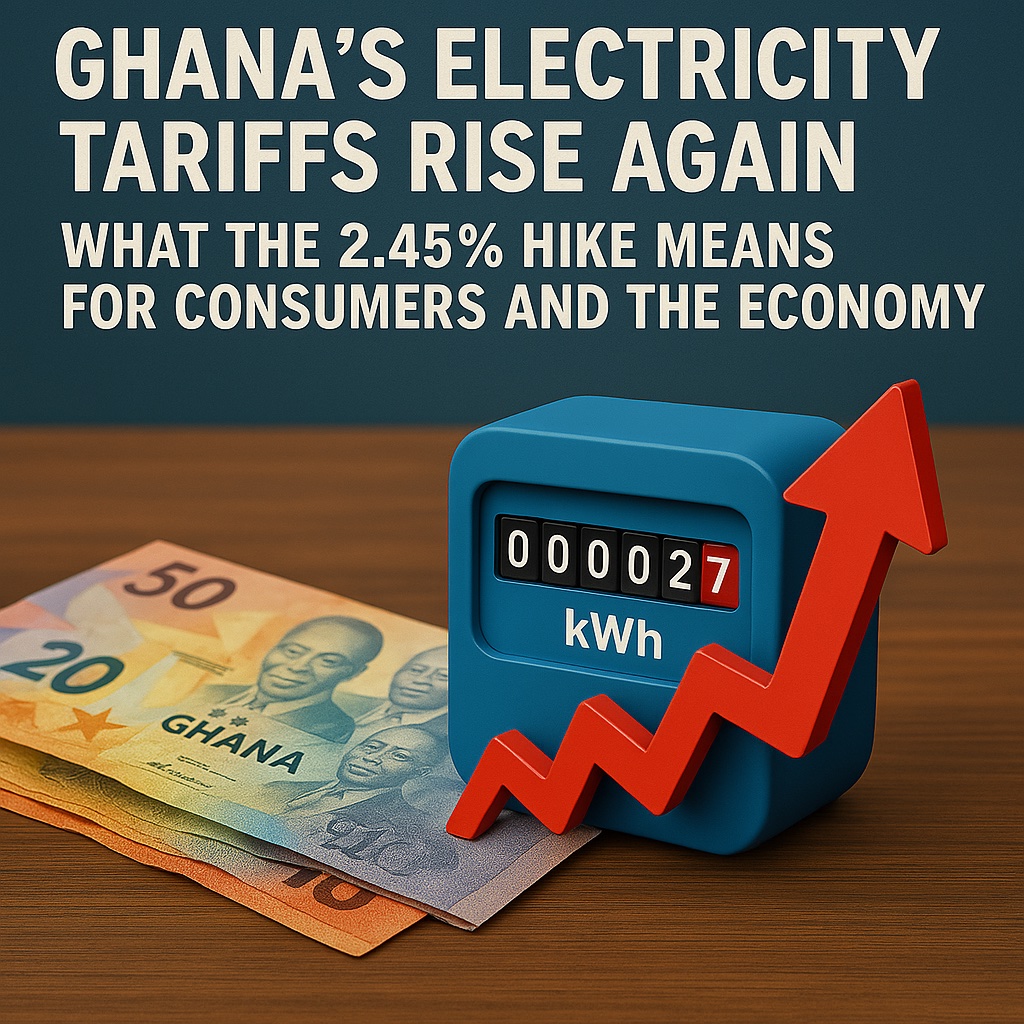Ghana’s Electricity Tariffs Rise Again: What the 2.45% Hike Means for Consumers and the Economy

Accra, Ghana — June 30, 2025
“I used to stretch ₵50 of electricity for three weeks. Now it barely lasts two,” laments Madam Efua, a fish seller in Tema. “If the prices keep climbing, how do we survive?”
She isn’t alone. As of July 1, 2025, Ghanaians across all sectors are feeling the ripple effects of yet another tariff increase, this time by 2.45%, according to the Public Utilities Regulatory Commission (PURC). Framed as a quarterly adjustment, the move has reignited national debate about energy affordability, regulatory transparency, and economic recovery.
📈 The Numbers: What Changed?
The 2.45% rise affects residential, commercial, and industrial users.
| Consumer Band | Old Tariff (₵/kWh) | New Tariff (₵/kWh) |
|---|---|---|
| Lifeline (≤ 30 kWh/month) | ₵0.7763 | ₵0.7953 |
| Residential (≤ 300 kWh) | ₵1.7575 | ₵1.8019 |
| Industrial & Commercial | Varies | +2.45% applied |
> 💧 Water tariffs: No changes announced for this quarter.
🔍 Why the Increase?
According to PURC, this quarter's adjustment was based on key economic and sector-specific indicators:
-
Exchange rate: GH₵15.70 → GH₵10.31/USD
-
Inflation: 20.67% (year-on-year)
-
Natural gas price: $7.63 → $7.71 per MMBtu
-
Energy generation mix: 71.2% thermal, 28.8% hydro
-
Legacy sector debt: ₵488 million still outstanding
Despite the Ghana cedi's appreciation and inflation stabilization, PURC maintains that rising natural gas costs and infrastructure demands warranted the upward adjustment.
🧠 Explainer: Why Thermal Power Is Expensive
Unlike hydro, thermal generation (which dominates Ghana’s energy mix) requires imported fuel and complex infrastructure. That means every fluctuation in global oil and gas markets directly impacts your electricity bill.
💬 Public Reaction: Transparency Under Fire
The decision has triggered a backlash from civil society and consumers. On UTV’s “Midnight Discussion”, Ben Nsiah, Executive Director of the Centre for Environmental Management and Sustainable Energy (CEMSE), called the hike “a betrayal of public trust.”
“We expected a reduction, not a hike, given the cedi’s rebound,” he said.
CEMSE and CUTS International released a joint statement (covered by GhanaWeb, Modern Ghana, and HappyGhana) accusing PURC of misusing its tariff formula and not disclosing its calculations publicly.
> 🗣️ “Ghanaians already pay more for electricity than our neighbours in Côte d’Ivoire and South Africa,” Nsiah noted.
🏛️ Government’s Defence: Avoiding Collapse
Defending the increase in Parliament on June 27, Majority Leader Mahama Ayariga stated:
“If we don’t adjust tariffs, ECG will collapse. Then we’ll face darkness and economic paralysis.”
His comments, reported by Pulse Ghana, YEN.com.gh, and Citi Newsroom, stressed that ECG requires financial stability to pay power producers, maintain infrastructure, and avoid a return to “dumsor.”
📊 A Look Back: Tariff Trends in 2024
| Date | Electricity Tariff Change | Water Tariff Change | Notes |
|---|---|---|---|
| July 1, 2024 | +3.45% (lifeline), +5.84% (residential) | +5.16% | Inflation, fuel costs |
| Oct 1, 2024 | +3.02% (all categories) | +1.86% | Exchange rate volatility |
These increases were tied to Ghana’s IMF-backed fiscal framework requiring quarterly cost-reflective pricing.
💡 What This Means for You
The impact is real:
-
Low-income homes may spend over 25% of household income on utilities
-
Small businesses face thinner margins or pass costs to consumers
-
Manufacturers may reduce output or consider alternate power sources
> 🎙️ “It’s a delicate balance between affordability and keeping the lights on,” said Alfred Appiah, economist, in a Joy Business interview. “But too many hikes too fast risk tipping families into energy poverty.”
Some Ghanaians are increasingly relying on prepaid meters, reducing non-essential usage, or exploring solar alternatives.
🔮 What’s Next?
The PURC says it will:
-
Publish detailed tariff models quarterly
-
Monitor ECG and GRIDCo service standards
-
Explore incentives for renewable energy adoption
Meanwhile, ECG’s revenue mobilization task force is visiting defaulting institutions and intensifying metering audits.
📣 Final Thoughts
Ghana’s electricity pricing is more than an economic issue; it’s a justice issue. The key challenge ahead isn’t just how to price power, but how to do so transparently, fairly, and in a way that energizes, not burdens, the country’s future.
“You can't build trust in the dark,” Nsiah concluded in an op-ed for The Business & Financial Times. “We need pricing, but we need truth with it.”
🧑🏽💻Tell Us Your Story
Has your electricity usage changed since the tariff hike? Are you switching to solar or scaling down your operations? Use the hashtag #PowerTalkGH on X or email your story to contact@Traynews.com for a chance to be featured in our follow-up report.



0 Comments
No comments yet, be the first to comment